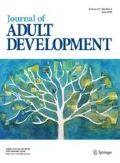Abstract
This paper presents a normative pedagogical model that integrates leadership theory, student development, and cognitive/ego development. The first step, assessment of students' developmental stage/needs, uses a developmental model to assess students' developmental and motivational needs. The second step, selection of teaching style, incorporates leadership literature to develop teaching styles selected based on the developmental and motivational needs of students. The third step in the continuous process, evaluation of outcomes, involves assessment of either continued development and/or increased student motivation and improved student learning. Research and teaching implications of the proposed model are also discussed.
Similar content being viewed by others
REFERENCES
Bartunek, J., & Moch, M. (1987). 1st order, 2nd order, and 3rd order change and organizational development interventions: A cognitive approach. Journal of Applied Behavioral Science, 23, 483–500.
Bass, B. (1985). Leadership and performance beyond expectations. New York: Free Press.
Belenky, M., Clinchy, B., Goldberger, N., & Tarule, J. (1986). Women's ways of knowing: The development of self, voice, and mind. New York: Basic Books.
Blake, R., & Mouton, J. (1964). The managerial grid. Houston: Gulf Publishing.
Block, P. (1993). Stewardship: Choosing service over self-interest. San Francisco: Berrett Koehler Publishing.
Bonwell, C. C., & Eison, J. A. (1991). Active learning: creating excitement in the classroom. Washington, DC: George Washington University.
Burns, J. (1978). Leadership. New York: Harper & Row.
Deming, W. (1986). Out of the crisis. Cambridge, MA: Center for engineering studies, MIT.
Dressel, P., & Mayhew, L. (1954). General education: Explorations in evaluation. Westport, CT: Greenwood Press.
Erickson, B., & Strommer, D. W. (1991). Teaching college freshmen. San Francisco: Jossey Bass.
Fiedler, F. (1964). A contingency model of leadership effectiveness. In L. Berkowitz (Ed.), Advances in experimental social psychology. New York: Academic Press.
Glaser, E. (1985). Critical thinking: Educating for responsible citizenship in a democracy. National Forum, 65, 24–27.
Gressler, L. (1976). The effect of research courses upon the attitudes and critical thinking abilities of graduate students. Unpublished doctoral dissertation, Mississippi State University. Dissertation Abstracts International, 37, 3994A.
Katz, J., & Henry, M. (1988). Turning professors into teachers: A new approach to faculty development and student learning. New York: MacMillan Publishing Company.
Katz, D., & Kahn, R. (1978). The social psychology of organizations. New York: John Wiley.
Kegan, R. (1982). The evolving self: Problem and process in human Development. Cambridge, MA: Harvard University Press.
Kirby, P., Paradise, L., & King, M. (1992). Extraordinary leaders in education: Understanding transformational leadership. Journal of Educational Research, 85, 5.
Kohlberg, L. (1976). Collected papers on moral development and moral education. Cambridge: Center for Moral Education.
Kuhnert, R., & Lewis, P. (1987). Transactional and transformational leadership: A constructive/developmental analysis. Academy of Management Review, 12, 648–657.
Loevinger, J. (1976). Ego development. San Francisco: Jossey-Bass.
Lyle, E. (1958). An exploration in the teaching of critical thinking in general psychology. Journal of Educational Research, 52, 129–133.
Maslow, A. (1954). Motivation and personality. New York: Harper & Row.
McClelland, D. (1975). Power: The inner experience. New York: Irvington.
McKeachie, W. (1970). Research on college teaching: A review. Washington, DC: ERIC Clearinghouse on Higher Education.
McMillan, J. (1990). Enhancing college students' critical thinking: A review of studies. In E. Pierre, M. Riordan, & D. Riordan (Eds.), Research in instructional effectiveness. Harrisonburg, VA: Center for Research in Accounting Education.
Pascarella, E. (1985). College environmental influences on learning and cognitive development: a critical review and synthesis. In J. Smart (Ed.), Higher education: Handbook of theory and research, Vol. 1 (pp. 1-62.), New York: Agathon Press.
Paul, R. (1984). Critical thinking movement: A historical perspective. National Forum, 65, 2–32.
Perry, W. (1970). Forms of intellectual and ethical development in the college years: A scheme. New York: Holt, Rinehart & Winston.
Piaget, J. (1972). Intellectual evolution from adolescence to adulthood. Human Development, 15, 1–12.
Powers, R. (1992). Instructor excellence: Mastering the delivery of training. San Francisco: Jossey-Bass.
Senge, P. (1990). The fifth discipline. New York: Harper.
Smith, D. (1977). College classroom interactions and critical thinking. Journal of Educational Psychology, 69, 180–190.
Terenzini, P., Theophilides, C., & Lorang, W. (1984). Influences on students' perceptions of their academic skill development during college. Journal of Higher Education, 55, 21, 636.
Tomlinson-Keasy, C., & Eisert, D. (1977). Second year evaluation of the ADAPT program. In Multidisciplinary Piagetian-based programs for college freshmen: ADAPT. Lincoln: University of Nebraska.
Young, R. (1980). Fostering critical thinking. San Francisco: Jossey-Bass.
Rights and permissions
About this article
Cite this article
Barbuto, J.E. Developing a Leadership Perspective in the Classroom. Journal of Adult Development 7, 161–169 (2000). https://doi.org/10.1023/A:1009594213701
Issue Date:
DOI: https://doi.org/10.1023/A:1009594213701




